The departure of Alastair Clarkson from Hawthorn was both inevitable and painstaking. Tormented by Covid-19 hubs and one last failed push at a flag before the wheels fell off, JAY CLARK goes inside the exit of the club’s most successful coach.
Hawthorn’s most senior club officials were called for an urgent meeting in the Perth hub.
Alastair Clarkson, the greatest coach of the modern era, needed to talk.
It was mid-2020 and the Hawks were holed-up at Crown Hotel in Perth deep in the Covid-19 crisis when the coaching situation suddenly became unexpectedly serious.
After a 32-point loss to West Coast in Round 12 which left the Hawks at 4-7, Clarkson told football boss Graham Wright and chief executive Justin Reeves his time could be up as senior coach.
After 15-and-a-bit years in the job and four glorious premierships, the losses had begun to mount, his replacement Sam Mitchell was already in hand, and the pressures of hub life were taking their toll.
In a meeting room used as an office by the Hawks, Clarkson questioned whether it was in the club’s best interests for him to pass the reins over to Mitchell at season’s end.
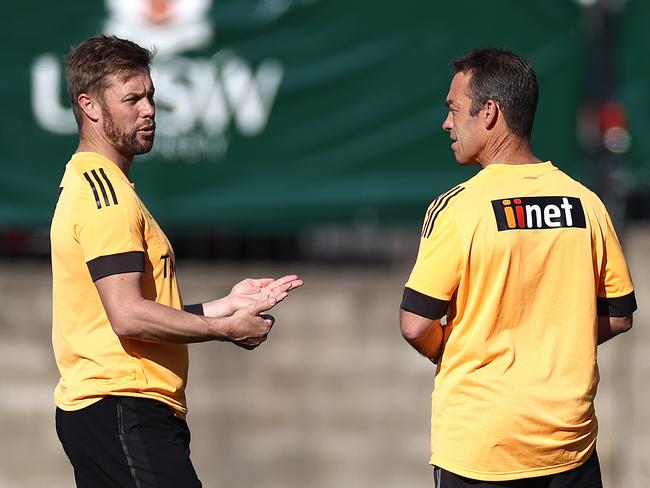
That day against West Coast, the ageing Hawks were clearly off the pace, managing only two goals to half time.
The club had added another three experienced players at the trade table the year before but had slid down the ladder with the second-oldest team in the league, according to Champion Data.
And it was clear the Hawks’ recruiting strategy had become shortsighted, coming off one of the most successful runs in footy.
Still, the senior coaching query came as a complete shock to the other club bosses at the time, as Clarkson was contracted for another two-and-a-half years until the end of 2022.
Clarkson had signed a long and lucrative extension in 2018 when he was still regarded as the No. 1 coach in the caper.
When that decision was made in 2018, the Hawks had bowed out of the finals in straight sets and, instead of pulling the trigger on more young talent when some of the signs were there, the Hawks topped-up.
After landing star onballer Tom Mitchell (Sydney Swans) and prime midfielder Jaeger O’Meara (Gold Coast) in 2016, the Hawks gave up a first and second-round pick and young backman Ryan Burton for goal kicker Chad Wingard (Port Adelaide) in the shock of the 2018 trade period.
They also landed developing half back Jack Scrimshaw (Gold Coast), and injured wingman Tom Scully (GWS Giants), meaning the Hawks’ first pick in the 2018 draft was number 52 (Jacob Koschitzke).
At a key crossroad, the club was all-in on chasing more flags.
But, after missing finals in 2019, the reality of the situation had become clear midway through 2020 as the sun set on the Hawks’ golden reign.
In Round 2, 2020 the Hawks were belted by Geelong by 61 points in front of empty stands and then fielded the oldest team in AFL/VFL history the following week against Richmond on a Thursday night at the MCG after taking only two first-round picks (jet midfielder Will Day and Burton) in the previous nine drafts.
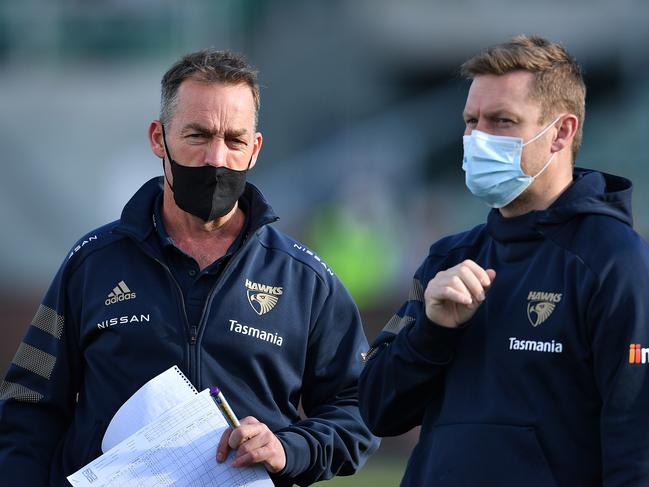
The sirens were blaring on the list profile, and the club soon realised it had to hit the draft at one of the most difficult times to select top young talent as pathway programs around the country ground to a halt because of Covid-19.
So that night after the West Coast loss in Perth in 2020, which included a scoreless first quarter, Clarkson raised the idea with Wright and Reeves about moving on, with two years to run on his contract.
Clarkson had previously convinced Mitchell, the champion onballer, four-time premiership star and former captain, to leave West Coast after its 2018 premiership win to join Hawthorn’s coaching panel as Clarkson’s likely replacement.
At the Grand Hyatt Hotel in Melbourne in 2018, former Hawthorn players and staff gathered for a 10-year reunion of the Hawks’ 2008 premiership, where Clarkson and club chiefs helped seal the deal to bring Mitchell back to the brown and gold.
But back in the Crown Hotel in Perth in mid-2020 Clarkson’s future at the club suddenly hung in the balance after a dismal streak of six losses in seven games in the first year of Covid-19.
In trademark fashion, Wright was remarkably calm for a man who was dealing with the prospect of an earlier-than-expected coaching exit.
Wright urged Clarkson not to make any rash decisions, take a deep breath, and consider things further after a conversation with his family and a good night’s sleep.
But there was the prospect, as Clarkson explained, that he was done or close to it, after giving his all for more than a decade-and-a-half at footy’s coalface.
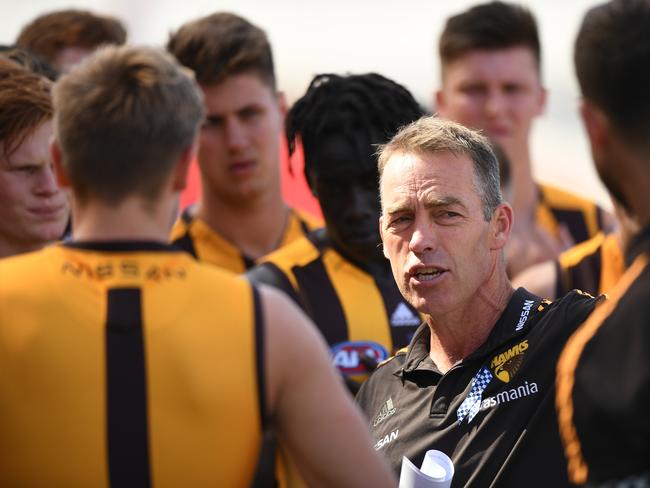
But was his replacement ready to step up?
Mitchell had already displayed a clear vision on the club’s list strategy in his regular check-ins with club leaders, including footy director Richie Vandenberg, and was eager to recruit certain types of players to fit his preferred game style.
Mitchell had strong footy philosophies, a concrete determination and a sharp tactical hold on the game of Australian rules.
His footy IQ was always off the charts.
Mitchell was a ruthless competitor as a player, a champion midfielder, and had the self-awareness to know his connection with players and relationships was what he had to soften to round-out overall his coaching repertoire.
He was as driven as they come, and born to coach, his friends all say.
And Wright was one of Mitchell’s biggest fans.
While Mitchell was never guaranteed Hawthorn’s senior job when he returned to Waverley, he was always eight lengths clear the frontrunner.
And that night, on Sunday, August 16, 2020 in a mostly-empty Perth hotel, it would seem Mitchell was about to get the senior coaching gig years earlier than anyone envisaged, as word filtered through the playing ranks that Clarkson was suddenly tossing up his future.
Clarkson, then aged 52, was passionate about most things and unafraid to speak plainly, but this was quite an escalation.
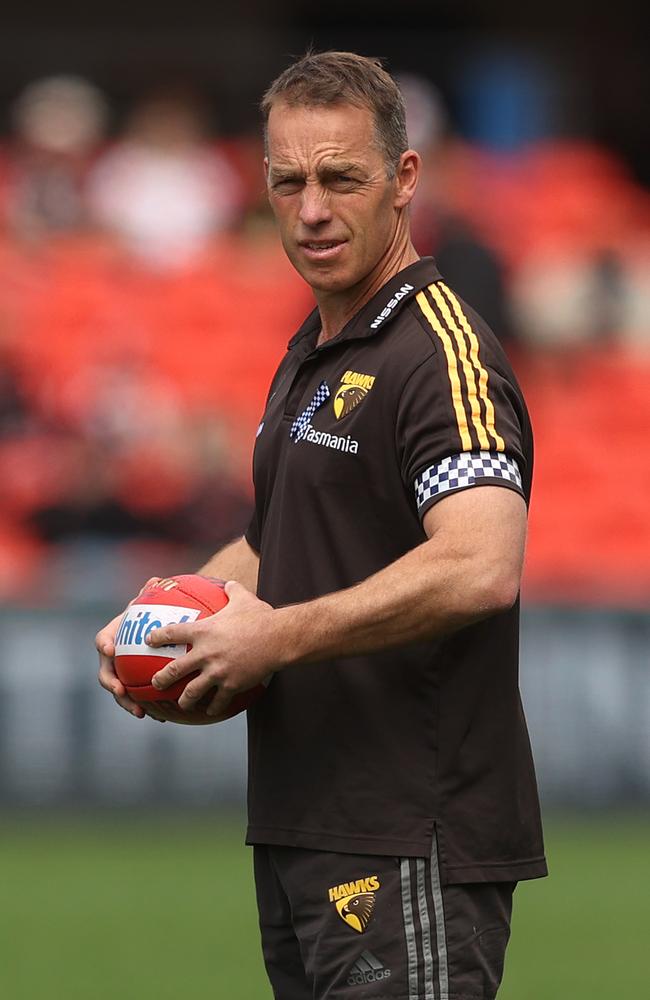
However, about two hours later, Clarkson called another meeting.
The senior coach had changed his mind. Things had cooled.
The senior coach said he would stay the course. He was disappointed after the loss to West Coast, but made clear to Wright he was still invested. He was digging in.
Clarkson had made commitments to players he had recruited based on the three-year extension he signed late in 2018.
So, at the end of a dramatic night in the Hawthorn hub in Perth, everyone exhaled somewhat.
The story didn’t get out to the media, and the Hawks packed their bags and strapped on their face masks as they boarded flights for South Australia where they would play out the remainder of the season from the Barossa hub.
But things were on edge, and they would get worse before they would get better.
BAROSSA BLOW-UP
Clarkson will go down in history as one of the game’s most successful coaches and influential figures.
At Hawthorn, he racked up 228 wins and 158 losses, and won four of five grand finals.
When the Kennedy Community Centre is constructed in Dingley, and the club’s heroes like Allan Jeans, John Kennedy Sr and Luke Hodge are enshrined in bronze, Clarkson will also command a statute at the main entrance, as an icon of the club.
Currently, Clarkson has fallen out with the Hawks over the racism scandal which is headed for the Federal Court.
“Their governance and conduct in this whole thing, the Hawthorn Football Club, just shameful,” Clarkson said.
“Let‘s do an investigation on them (Hawthorn) and their practices and see how they go.”
But back when he was in the Hawks’ top job, Clarkson never shied away from a tough call and he was often hardest on the Hawks’ most experienced and decorated players. And that included managing their departures.
Mitchell went to West Coast and Jordan Lewis moved to Melbourne at the end of 2016, and the following year Luke Hodge made the move to Brisbane Lions.
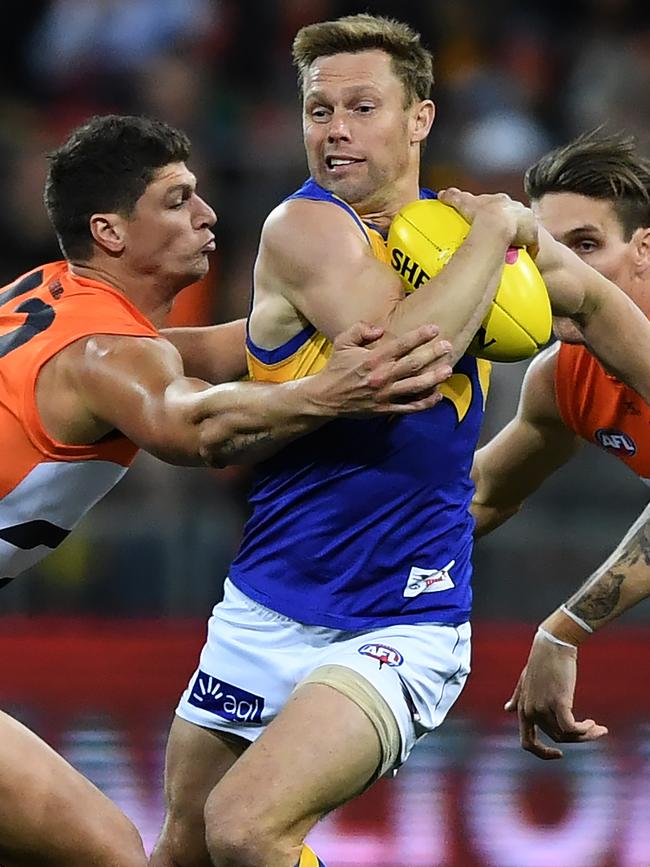
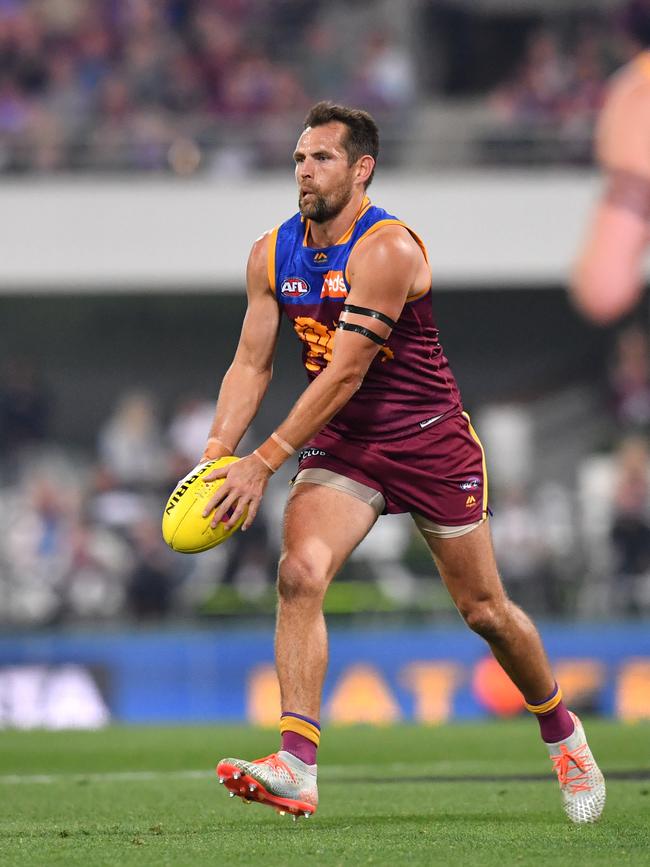
Lewis had one year to run on his deal at the Hawks but it was suggested to him that nothing was guaranteed past that, so he accepted a three-year contract from the Demons.
Lewis, a superstar midfielder, said Clarkson tried to persuade him to join Gold Coast as part of the O’Meara deal, without success.
“It seemed to me that this was all driven by ‘Clarko’ because he still believed the team was in premiership contention, and sort to control a lot of the movement himself,” Lewis said.
“It was also apparent that Graham Wright wasn’t necessarily involved in any of these conversations. He was apologetic and a little surprised.
“‘Clarko’ went a bit rogue for a while.”
In 2019, there was even more angst over Jarryd Roughead’s future.
Roughead, who was captain that season, was dumped to the VFL team for Round 8 amid a form slump. He returned in Round 14 and had two marks, and was dropped again.
Even when it came to his final game against Gold Coast when Roughead booted six goals in a rollicking triumph over the Suns at Marvel Stadium there was some strong internal debate over whether ‘Roughy’ should receive a farewell game.
His premiership teammates were desperate to play with Roughead one last time, with teammate Isaac Smith describing it as “one of the most enjoyable games I have been involved in” as the full-forward enjoyed a day out.
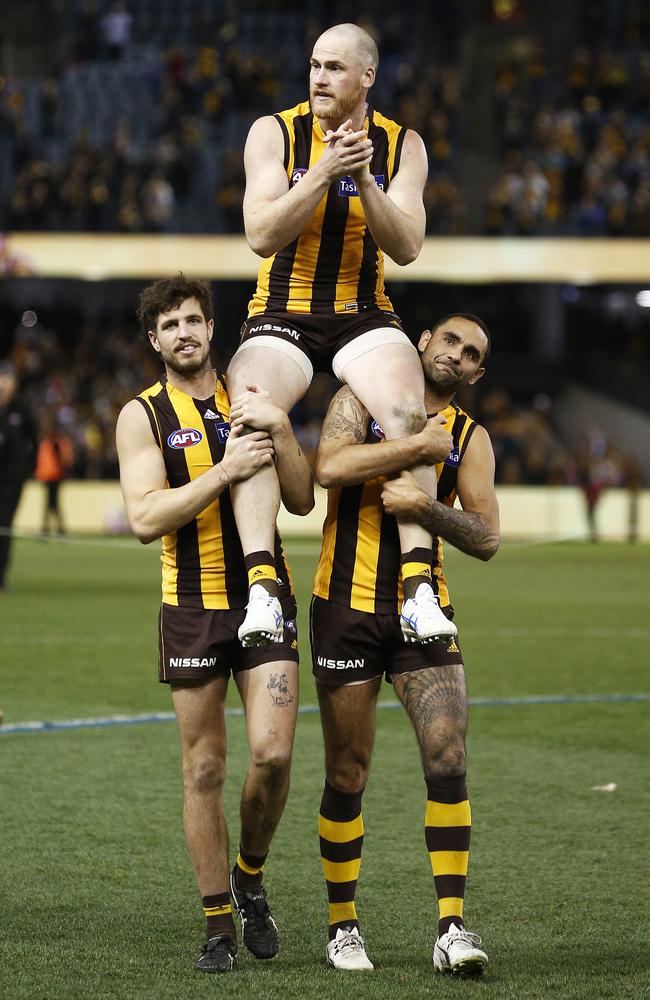
Clarkson said he would always put the club’s interests ahead of any personal player sentiment, which is why the coach opted for young tall Mitch Lewis – who would become one of the Hawks most important players – over Roughead in 2019.
But as Hawthorn shifted into the Barossa hub in mid-August 2020, the club environment had become increasingly tense, and the stress was felt by everyone, including the players.
And it was not just because of the difficult Covid-19 restrictions, difficulties for families back home in Victoria, the related stresses on players, and the Hawks’ poor form.
Spot fires were being put out in the football department regularly. Some days there were wild fires.
Wright and Clarkson disagreed on the future of champion playmaker Shaun Burgoyne, who by the end of that season was within striking distance of 400 AFL games.
Clarkson wanted Burgoyne, then aged 37, to play on for another year. To go on for his leadership and influence on the team and for his own individual standing and recognition.
Only four other players had reached the magical 400-game mark in AFL/VFL history.
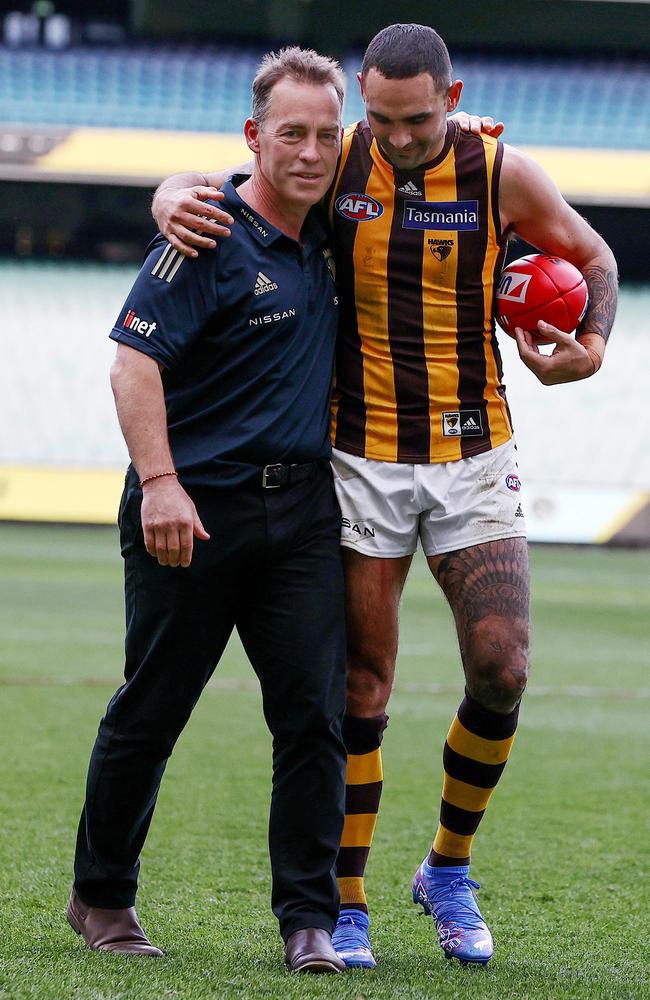
But Wright, on the other hand, thought Burgoyne’s time was up, and the tension between the football boss and the senior coach bubbled over.
For a period in the Barossa hub, the communication between Wright and Clarkson dropped right off. Clarkson didn’t want to be in the Barossa hub, one hour’s drive away from Adelaide Oval, when other clubs were based in sunny Queensland.
While Clarkson and Wright don’t hold any grudges, the time in the Barossa was a remarkably bumpy ride for a club whose list had tipped over the cliff edge.
In all, 13 players left the Hawks that year including former captain Ben Stratton (retired), champion wingman Smith (Geelong), veteran wrecking ball Paul Puopolo (retired) and premiership full back James Frawley (retired).
But Burgoyne wasn’t one of them.
In the end, the club agreed with Clarkson on Burgoyne, and the contract extension was formalised.
On the field, the Hawks had rattled off seven-straight losses in the back end of 2020 before pumping Gold Coast by 51 points in the last game of the regular season at Adelaide Oval.
It was a somewhat positive end to a terribly difficult season, with a side still stacked with veterans including eight players aged 29 or older in the final-round win over the Suns.
WRIGHT CALL
The Hawks finished 15th in 2020, and Wright had been worn out.
Worn out by Clarkson’s fire-and-brimstone approach, the footy boss told Kennett at a meeting at the president’s home in Melbourne’s eastern suburbs the day after the 2020 AFL rookie draft.
The Hawks had a mountain of work to do to start rebuilding the team the following year in 2021 and, in what was another doozy, the Hawks would have to start talking about Clarkson’s contract, and whether he would be extended beyond 2022.
It loomed as one of the toughest calls the club has made in recent times, and it weighed heavily on key figures considering the respect and gratitude they had for Clarkson after four flags.
But there were concerns at board level about the influence Clarkson was having on recruiting, and whether the Hawks would have benefited from a longer-term strategy in previous years.
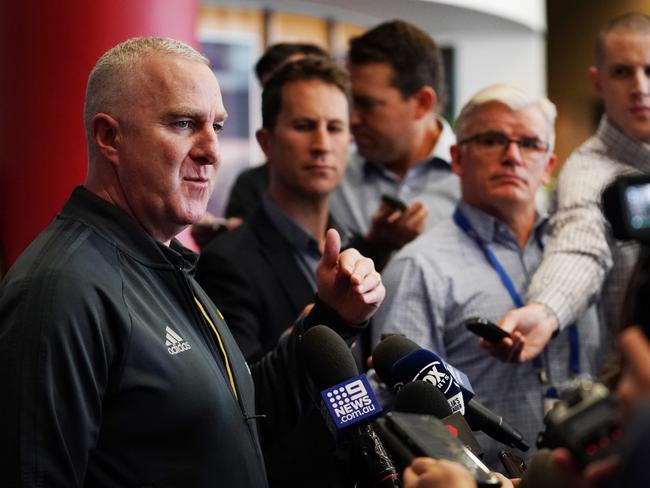
Subsequently, questions were being asked about whether the playing group would benefit more from a fresh coaching voice, and a different style of leader as they began to move into a new era. And it was in the Barossa hub that the dynamic shifted. And it was not in Clarkson’s favour.
Regardless, Wright would play no part in the Clarkson contract discussion after signing off himself.
Wright’s resignation was massive blow to the club as the talent expert had been a central pillar in the Hawks’ glorious reign at the top, but he told Kennett he wanted out at the end of a taxing 2020 season.
Wright submitted his resignation on December 11, 2020, but Kennett and Reeves would keep quiet on it for weeks because there was a hunch it could anger Clarkson in the same way he erupted in famous fashion at former chief executive Ian Robson when he left for Essendon in 2009.
Wright, who is regarded as one of the most accomplished recruiters, list bosses and negotiators in the game, wanted a new challenge, and a fresh start.
He sought calmer waters, and less volcano.
Wright told Kennett he and Clarkson had reached the end of the road together after one of the most successful partnerships in the game.
And on Friday, January 15, 2021 it was announced Wright had departed Hawthorn.
Three days later, on Monday, January 18 Wright was appointed Collingwood’s football manager.
At Collingwood, Wright had a similarly massive brief, but without the tension.
Magpies’ coach Nathan Buckley, who had tried to poach Wright for many years, was out of contract at the end of 2021, and the Pies were also on the slide.
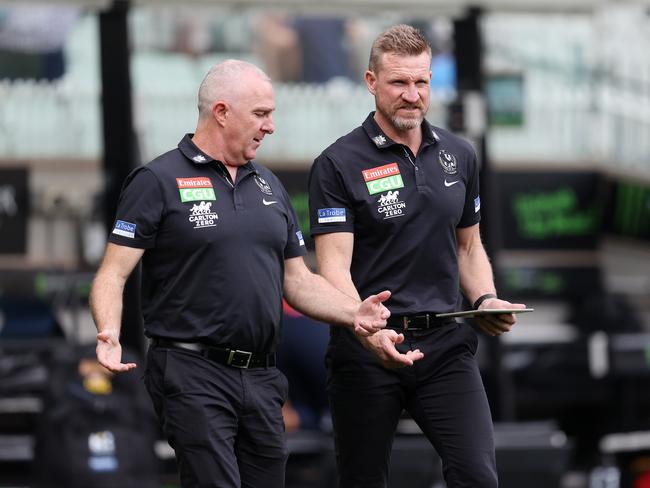
As the new highly-rated footy boss, a big part of Wright’s new job was to make the call on Buckley, find his coaching replacement and re-tool the Magpies’ list.
And as Collingwood hit the skids big-time that year, losing nine of its first 11 games in 2021, it became quite clear Buckley would exit.
On June 9 the decision was announced. It was mutual and respectful. Buckley parted ways with his beloved footy club in a classy and dignified manner.
But there was suddenly a big vacancy at Collingwood, and who was up top of Wright’s coaching wish list?
It was Mitchell.
ON THE CLOCK
Very quickly, Wright called Mitchell about being part of the Magpies’ process.
A juicy carrot was dangled, and more than anyone, Wright knew how good Mitchell was with a magnet board.
Wright thought Mitchell was not only a senior coach in the making, but on track to become one of the best coaches in the game.
It meant over at Hawthorn, a decision on Clarkson’s contract had to be brought forward, and formalised.
Clarkson, who initiated the contract conversation earlier that year, had already presented to Hawthorn executives and the board about his vision for the club’s future. At the start of 2021, Clarkson wanted to go again.
When he was first appointed Hawthorn coach in late 2004 the former North Melbourne tough nut’s presentation was, in part, about a moon landing; how he could rocket the Hawks from the bottom to the top.
And, somewhat remarkably, Clarkson took only four years to hoist his first premiership cup, guiding the budding Hawks to the 2008 flag.
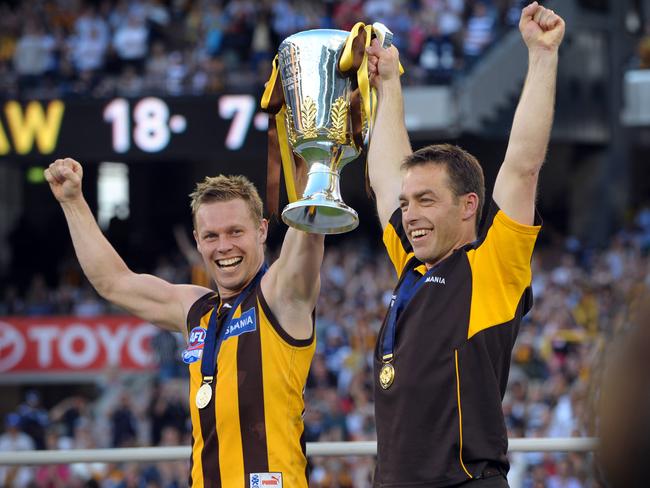
People at Hawthorn believe that first premiership was his greatest coaching triumph.
He devised a defensive zone strategy labelled “Clarkson’s cluster” which choked the opposition including the high-scoring Cats, led the mission to recruit matchwinner Stuart Dew, and taught a young team including superstars Lance Franklin and Cyril Rioli to play a clever and cohesive system.
He was a master motivator, Clarkson, but there was a fear factor to his coaching genius, too.
He could blow a gasket, and in 2012 Clarkson put his left fist through the wall of the MCG coach’s box after Matt Suckling botched a kick-in during a 47-point win over Collingwood.
I thought he was gonna do an Alastair Clarkson and punch a wall pic.twitter.com/WI0o21vGAg
— Jay (@AnAverageJay) May 30, 2020
In all, Clarkson climbed the grand final mountain three more times after the 2008 triumph, smartly tweaking and reinventing the team’s structure and the game plan, each time.
Clarkson’s Hawks famously “killed the shark” when they upset the Cats in 2008, lost to the Swans in the 2012 Grand Final, outlasted Ross Lyon’s Fremantle in 2013, took revenge on the Swans in 2014, and then destroyed West Coast in 2015 to claim the premiership three-peat.
Only four other clubs (Carlton, Collingwood, Melbourne twice, and Brisbane) have won three flags in a row in VFL/AFL history.
In all, the Hawks played finals in 10 out of the 12 seasons from 2007 – 2018, missing out in only 2009 and 2017.
But this was a supreme side, full of superstars and top draft picks whose achievements have at times faded into the background a little when it comes to the conversation around Clarkson’s premiership accolades.
He was the man who pulled the team back into line after over-celebrating the 2008 flag, but between 07 – 2018 there were a total of 11 individual All-Australian players.
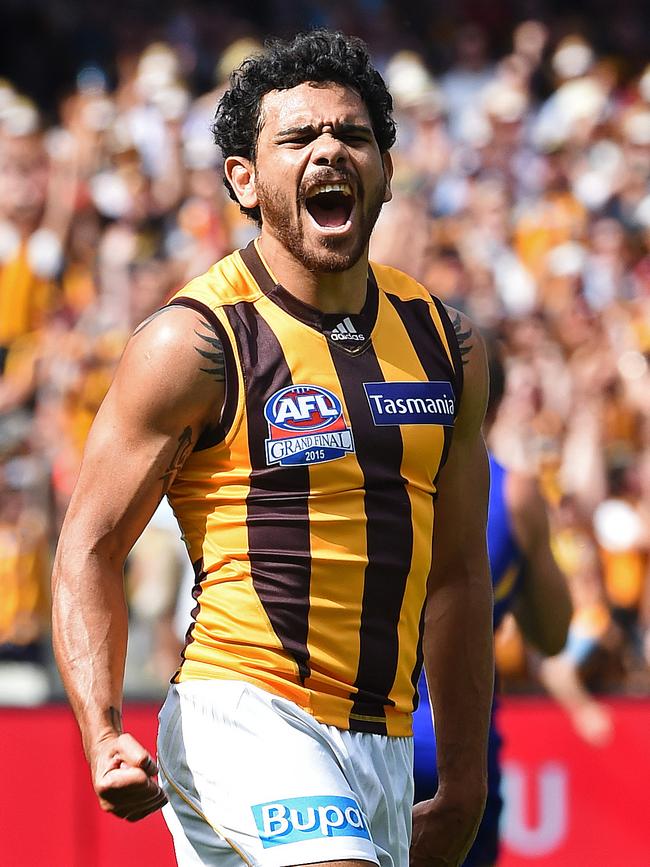
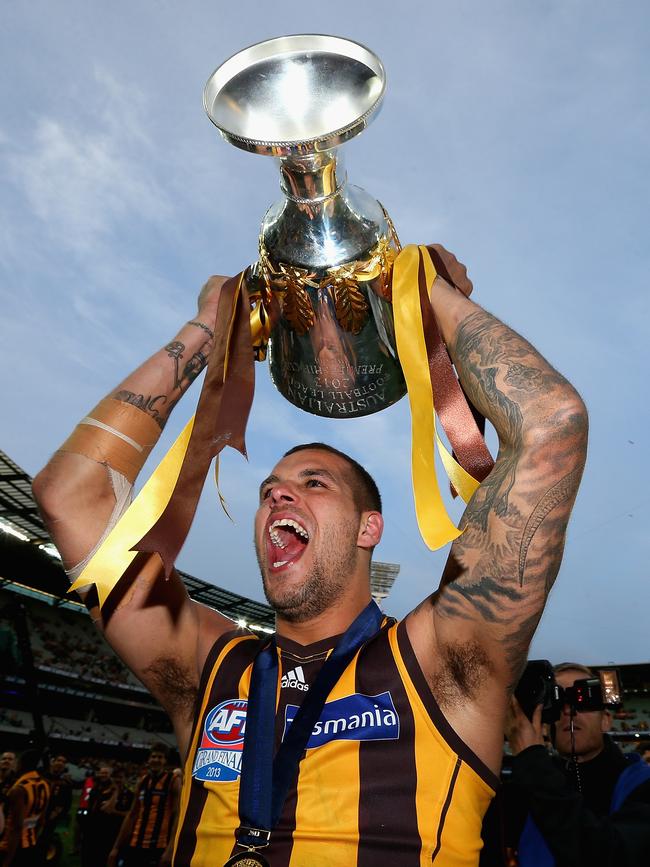
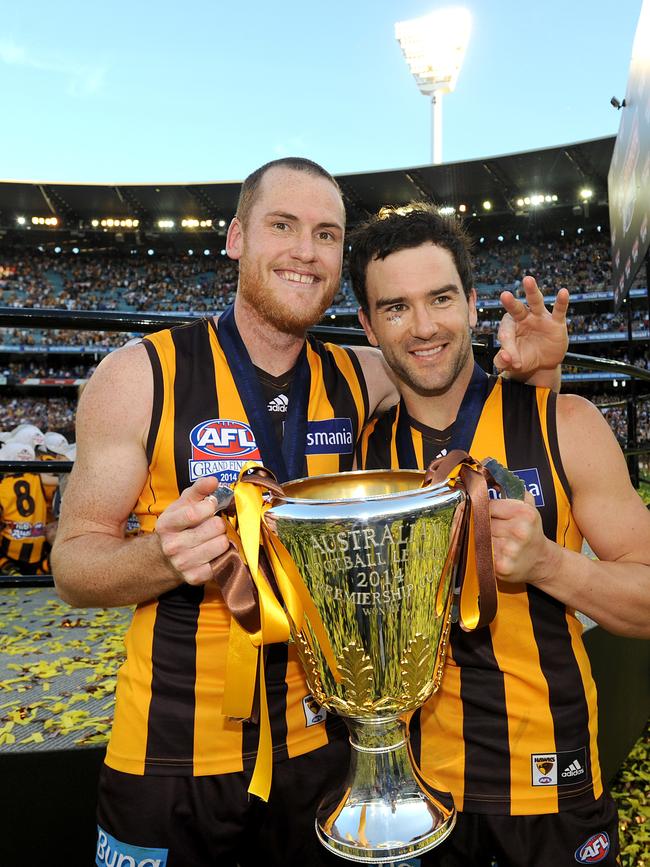
In 2021, Clarkson put forward his plan to do it all over again with a new crop, adamant he still had the motivation, passion and strategic nous to climb the AFL’s mountain once more.
But this was an enormous call for the Hawks and before Collingwood even came knocking for Mitchell mid-year, the board had already decided Clarkson’s contract would not be renewed.
Mitchell, then aged 38, was the man.
The tricky part was that the Hawks had to strike an arrangement which paid to respect to Clarkson and secured the future of Mitchell. If the board hesitated, it could lose him to Collingwood.
THE SUCCESSION PLAN
Footy director Vandenberg, a former captain and hard man himself, played the biggest role in the call along with Kennett.
And it was Vandenberg and Kennett’s view that the Hawks needed to begin the transition to Mitchell in the belief the team needed a fresh voice, a younger leader, a new strategic vision, and a different style of leadership to lead the next generation of Hawks over the next decade.
The club wanted “a modern coach”, Kennett said.
Mitchell had coached his own team at Box Hill team that year and had flourished, making a strong impression with his personal relationships and tactical acumen.
As a player, he was one of the best midfielders of the modern era, winning five best-and-fairests, three All-Australians and a Brownlow Medal in 2012 when Essendon’s Jobe Watson was stripped of his.
And the year he stepped into the coach’s box for the first time at West Coast in 2018 he led the midfield (including two All-Australian midfielders Andrew Gaff and Elliot Yeo) to a premiership under ex-Eagles’ coach Adam Simpson.
Over the course of June in 2021, many meetings were had at Waverley where the Hawks’ board considered various coaching options.
Clarkson was still contracted for one more year, and Kennett was not a fan of breaking contracts.
But how could the club satisfy him and Clarkson in a succession plan arrangement, where others had failed?
In any case, Clarkson initially wanted to stay in the job, quashing suggestions the succession plan could prompt him to step aside immediately.
It meant the club had to walk one of the tightest tightropes in the caper, satisfying both bulls in the paddock.
After weeks of talks, on June 30 the Hawks’ board ratified a plan which would see Clarkson remain in charge until the end of his contract in 2022 when Mitchell would take over.
On Saturday, July 3, Burgoyne played his 400th game in a 34-point loss to his former club, Port Adelaide.
Three days later on Tuesday, July 6, the Hawthorn succession plan was formally announced.
The press conference, featuring Clarkson, Mitchell, Kennett and Reeves, had an uneasy vibe.
The same tense air which filled the Barossa hub was back for the announcement of the succession plan.
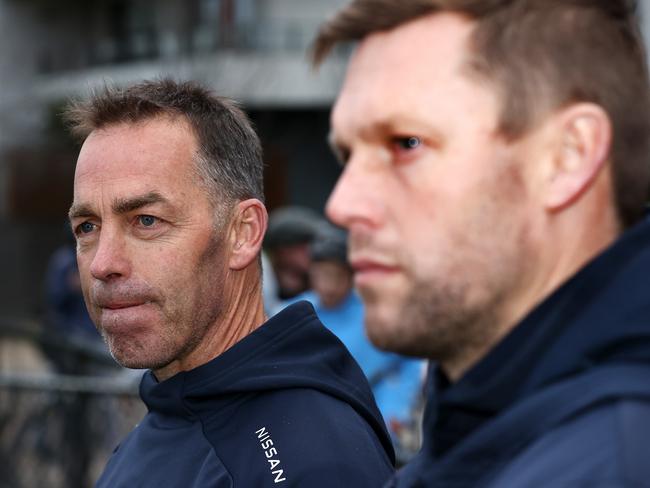
It was hard to tell if everyone – or in fact anyone – was happy with the new set up. Reporters were allowed one question each.
Clarkson said Kennett “had to come back for a second go (as president) to get me out of here. He tried the first time and it didn’t succeed.”
Kennett said it was a difficult decision, declaring he was “very careful in my two terms here not to fall in love with the liniment”.
The president said Hawthorn needed someone for the long-term as it could take the club “five to 10 years to get back and win (some) silverware”.
“The reality is it might take longer and we believe we have got to put in place someone who will lead us through the next decade,” Kennett said.
“These decisions are not easy. Far from it.
“You have both the emotional attachment one does to the most successful coach in recent times and you have a governance responsibility as a board to think about the next lap – if I can put it that way – for the Hawthorn Football Club.”
Clarkson said he and his wife Caryn had been “wrestling with this not for just the last 18 months but for a period of time, when is it right (to leave)?” as far back as the Perth hub.
“I had discussions with the club – very informally I might add, as far back as last year (in 2020) about what all this looked like for the club, and when was the right time for me to finish up,” Clarkson said.
“The thing keeps pulling you back to the football club is your loyalty to the club and the people within the club.”
That included turning down an offer, he said, from North Melbourne in 2020.
“I have had plenty of opportunities over the journey to move, including a significant offer from North Melbourne last year, which ‘Horse’ (John Longmire) and I were heavily courted,” Clarkson said.
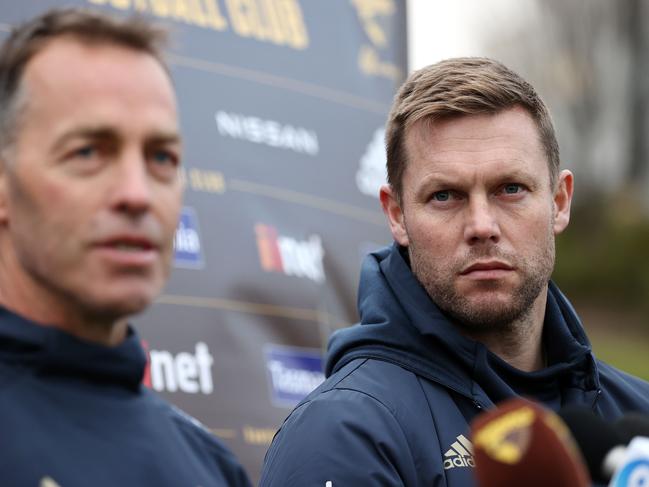
The problem with the succession plan, as it was struck, was that they had spent only 20 minutes on the practicalities of how it would work.
It was awkward. And things had been frosty at times between the pair in 2021 when Mitchell took over at Box Hill.
Loosely, it was decided Clarkson would focus on the present, and Mitchell was in charge of the future, Mitchell said.
But there were holes, and suspicions Clarkson’s nose was out of joint. Initially, they operated in “silos”, and it was doomed from the start.
“We talked about the day-to-day game style, week-to-week planning. Tactics and strategy, (was) all Clarko’s wheel house,” Mitchell said.
“Recruiting, more list management, staffing, all that fall closer to my remit.
“We had 15-20 minutes of conversation (about duties). We don’t think we have every answer.”
But players were confused; awkwardness permeated through the group, and it showed on field.
PLAYER POWER
Ray McLean, a leadership guru from Leading Teams, was brought into the club to help smooth out some bumps. Relationships had again begun to fray.
In particular, Clarkson and Reeves had fallen out. They were barely speaking.
And on the field the team’s form began to spiral. The first game after the succession plan was announced the Hawks got trounced by Fremantle by 62 points in Launceston. Then there was a spirited draw against Melbourne and a 19-point loss to Adelaide at Docklands.
Alarm bells were blaring again, and players were vocal about the problems and confusion in the inner sanctum. Who was the real boss?
Hawthorn’s most senior players including Ben McEvoy and Jack Gunston called a meeting to explain their frustrations.
And on Friday July 30, the succession plan which had been teetering on the edge for those few weeks finally imploded.
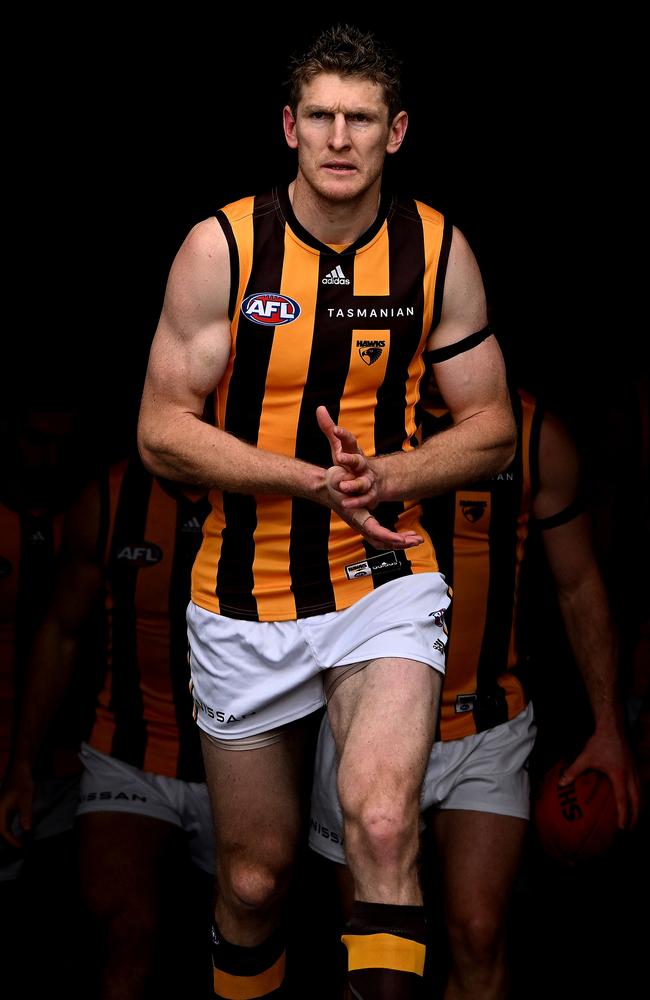
It had become increasingly clear Mitchell needed the reins on his own for everyone’s benefit, and Clarkson agreed. He was stepping aside. The four-time premiership coach vacated the hot seat for the man he hand-picked to replace him three years earlier in 2018.
“The last two weeks have been a pretty strong indication of the head space of the players,” Clarkson said.
“They were probably a little bit confused and dispirited with how things unfolded in the week leading into (a heavy loss to) Fremantle.
“It does create confusion, some of it you can’t help. It’s my view the footy club needs to free itself from my shadow.”
But Clarkson’s supporters weren’t happy.
“The one guy who might have had the opportunity to go out on his terms with a little bit of dignity would have been ‘Clarko’,” Brisbane coach Chris Fagan said.
Coaching legend Michael Malthouse agreed.
“It’s an insult to Clarkson, make no mistake about that,“ Malthouse said.
While the team trained outdoors at Waverley, Hawthorn chiefs – including Clarkson’s manager James Henderson – thrashed out the details of his severance, as the media pack waited outside.
After a few hours of talks, it was agreed Clarkson would leave at the end of the 2021 season and be paid out in full for 2022. There were two payments of about $900,000 in total.
The exit package included the continued use of a fully-maintained club car for 2022.
The payout ruffled feathers in the media, but the Hawks felt Clarkson deserved the cash out of respect for his stellar contribution.
The money was his reward, and his long service leave. It was a thank you.
NEW ERA
On a freezing cold afternoon on the boundary line at Waverley, another awkward press conference took place.
“This guy (Mitchell) is driving the bus. (The players) need one bloke leading the charge,” Clarkson said.
But the handling of matters was slammed. Hawthorn legend Jason Dunstall, who helped pick Clarkson in 2004, said the club acted too swiftly in 2021, and should have let Mitchell “go through the process to see if he actually gets the Collingwood job and take it from there”.
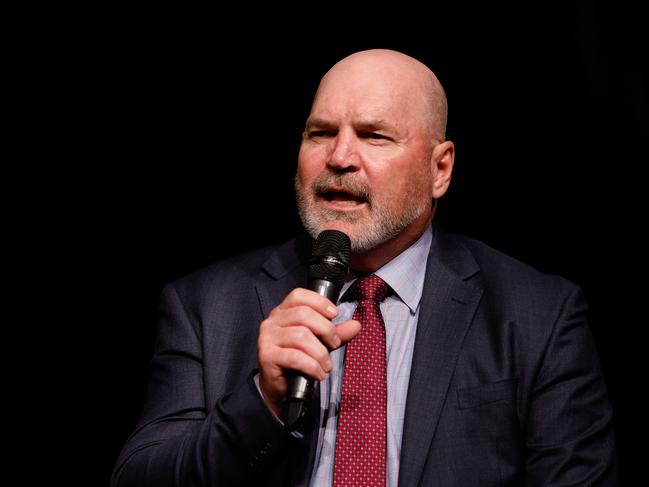
“I probably wouldn’t have pulled the trigger (on Mitchell) that early. I don’t think it needed to be,” Dunstall said.
“If he does get the (Collingwood) job and he is going well, (they can) get him back in a few years in time when his contract comes out.
“It’s been really poorly handled. It’s become a bit of an embarrassment.
“Over the years handovers have never been smooth, they have never really worked.
“Clubs get through them, but I don’t understand the point of doing them. If you’re going to rip the Band-Aid off, rip it off.
“You would like to see great respect handed out for a great coach.”
Clarkson, who took a year out of the game, signed a blockbuster five-year deal in late 2022 to help lead North Melbourne out of the AFL doldrums.
They have five wins from his 30 matches, turning a big corner over the past month.
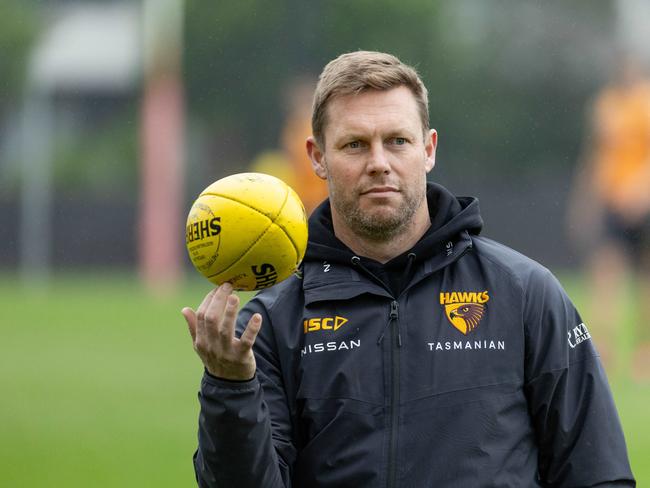
Mitchell’s Hawks sit four points outside the eight after a gutsy come-from-behind win over Fremantle in Launceston on Saturday without injured spearhead Lewis.
In his third season in charge, Mitchell has 24 wins from 62 matches.
While the coaching switch caused shockwaves in footy, and was labelled chaotic and a crisis at the time, any unease has turned into excitement about the young team’s upside. After five years out of the eight, the Hawks are rising again.
Kennett took responsibility for the messiness of the coach change, but believed the decision to anoint Mitchell as the new boss gave the club the best chance of more success.
“We’ve done what we think is the right thing (with the succession plan) … It hasn’t worked … I accept responsibility for that,” Kennett said.
“We hope that as a result of the goodwill that’s been shown by all parties we now have clear air. We have clarity, and we can move on.”

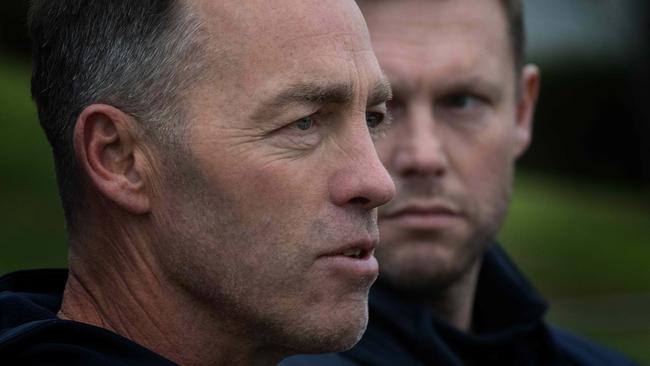
Add your comment to this story
To join the conversation, please log in. Don't have an account? Register
Join the conversation, you are commenting as Logout
Mass changes again at Dons, Rioli to miss Hawks grudge match
Willie Rioli sparked another chapter of drama between Hawthorn and Port Adelaide three months ago, but he won’t feature in their next clash, as the Bombers continue to swing the changes.
‘Me either’: Fans go scorched earth on fight
After years of trash talk, Paul Gallen and Sonny Bill Williams are finally meeting in the ring, bringing some fierce reactions from fight fans.